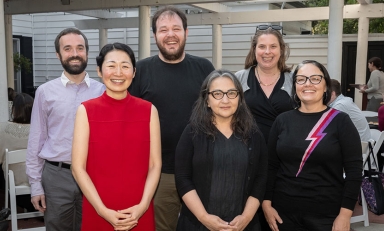A $5 million gift from the W.M. Keck Foundation will make possible the launch of a multi-phase renovation of Occidental College's 63-year-old chemistry building on a campus where 40 percent of students are pursuing degrees in the sciences.
The Keck gift will fund the first phase of the project, which will see the underutilized basement turned into state-of-the art teaching laboratories and the creation of the Academic Mastery Program Center on the ground floor, a flexible indoor/outdoor space that can be used for classroom teaching, lectures or receptions.
Work on the Keck-funded first phase of the $22 million project is scheduled to begin in 2024, which has required careful planning to rotate faculty and students from old to new spaces to ensure learning and research can continue uninterrupted.
One of the nation’s largest philanthropic organizations, the W. M. Keck Foundation supports outstanding science, engineering and medical research. For the past decade, the Foundation has been a generous supporter of the sciences at Occidental, helping to fund a new genomics center, research equipment for marine biology, and underwriting the summer research program.
Renovation of the Kenneth T. Norris Hall of Chemistry was one of the top recommendations of Occidental's Science Task Force, a 34-member group of alumni, parents, and faculty who assessed the current state of the sciences and science facilities at the college and issued a detailed report in October 2021.
The needs are substantial, the task force noted, given that more Occidental students major and minor in the sciences today--chemistry, biochemistry, biology, physics, cognitive science, computer science, geology and kinesiology--than in the social sciences or arts and humanities. Almost two-thirds of science majors are women, and 40 percent are students of color.
Those students go on to great success after they graduate. Over the past 30 years alone, Oxy students have received two Rhodes Scholarships, more than 50 National Science Foundation Graduate Fellowships, and over 40 Barry M. Goldwater Scholarships. In addition, about 60% of Oxy’s science graduates attend graduate school. According to a 2013 report by the National Science Foundation, Occidental is one of the country’s top producers of graduates who go on to receive doctorates in science and engineering.
Despite this record of success, "There remains an urgent need to redesign and equip all of our lab spaces to support the rapidly evolving teaching, learning and research requirements," the task force wrote.
Built in 1960, Norris Chemistry recently received extensive safety upgrades. But the mid-century teaching and research labs--central to Occidental's hands-on approach to teaching and research--are no longer equal to the task, science faculty say.
According to Chemistry Professor Chris Craney, roughly one-quarter of all students take a chemistry class during their four years at Oxy. “All those kids are doing labs, and right now they’re all squeezed into a really small, constrained space, which is frankly inadequate,” he says. “We need more space for our instructional labs, for student research opportunities, and for instrumentation and equipment.”
Once completed, the renovation of Norris will include not only expanded and redesigned teaching labs, but state-of-the-art faculty search labs and offices on the second and third floors; new spaces to encourage collaboration, creative thinking and problem solving among students; and the entirely new Academic Mastery Program center for Oxy's peer-led program that promotes excellence in biology, physics and math as well as chemistry.
The Norris renovation project is based on designs by JFAK Architects, whose work can be seen at Caltech, UCLA, and Claremont McKenna College, and GL Planning & Design, who has previously worked with UC Berkeley and Stanford, among others.
The W. M. Keck Foundation was established in 1954 in Los Angeles by William Myron Keck, founder of The Superior Oil Company. In addition to its support of science, engineering and medical research, the Foundation also funds undergraduate education and maintains a program within Southern California to support arts and culture, education, health and community service projects.




